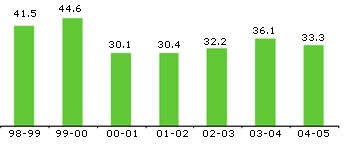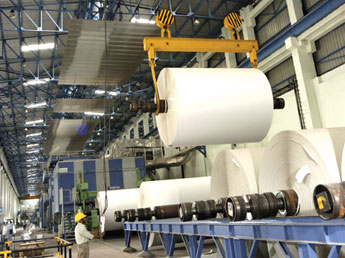| The Bhadrachalam unit continues to be the most
energy-efficient unit in its category of mills in the world (the international benchmark
for structurally similar mills is 32.0 - 40.93 GJ/tonne of paper). Specific Energy Consumption in the Bhadrachalam Paperboards Mill
(Giga Joules/tonne of paperboard)


Tribeni
The Specialty Paper Mill at Tribeni achieved a 6.8% reduction in specific energy
consumption over the previous reporting period.
Kovai
A number of energy-efficiency initiatives have been undertaken in the Kovai unit. These
have been described later in this report.
Other ITC units
All other ITC units continued energy conservation efforts through energy audits conducted
by experts, deployment of latest technologies, awareness campaigns and benchmarking.
ITC’s cigarette manufacturing units achieved 19.4% reduction in specific energy
consumption over the previous year. The average specific energy consumption of these units
stands at 8.24 GJ/million cigarettes. This compares very well with the specific energy
consumption of 20.27 GJ/million cigarettes, reported by British American Tobacco in its
Social Report of 2004-05. |
 |
Energy
Conservation at ITC Sonar Bangla Sheraton
The newly opened ITC Sonar Bangla Sheraton & Towers at
Kolkata has undertaken a number of initiatives in the field of energy conservation. This
has resulted in an 8.04% reduction in 2004-05 in total energy usage over the previous year
(in spite of 78% growth in room nights sold). Some of the measures adopted, such as
retrofitting of pumps, hot water generation using condensed steam, replacement of electric
heater with solar heater and installation of variable frequency drives for fans have not
only resulted in improved energy usage, but also reduced the Carbon Dioxide (CO2)
emissions by 2,841 tonnes per annum.

|
ITC continued its focus on improving the use of renewable energy such as biomass and
solar energy. Of the total energy used, 24.6% is generated internally from Biomass. A
number of units have installed solar thermal systems mainly for use in canteens and
kitchens.

|